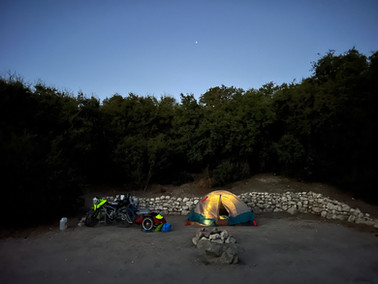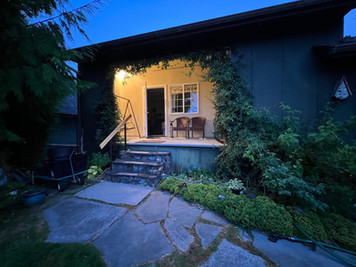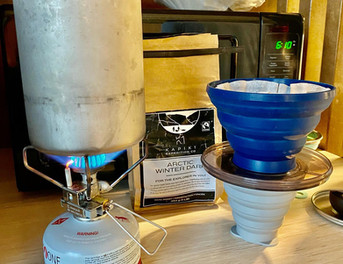FAQs - Planning an Expedition?
- joshuainegt

- Apr 14, 2024
- 4 min read
Updated: May 21, 2024
Over the years we have gotten a lot of questions about our running/biking trips. We (I) have already blathered on about gear and training, so here are some thoughts on preparation, expectations, and how to get along with a partner during these trips.
How do I prepare for something like this? Practice and experience. It would be tough to jump into a big expedition without some exposure to long-distance endurance events. It’s a good idea to get some practice with at least a few multi-day events. Test what your body can handle. Experience and push through the inevitable ups and downs. If your expedition is months long, it will be more fun (type 1 and type 2) if you know what to expect physically and mentally. When we started planning our first big trip, Shan and I had already gotten plenty of practice running and biking for multiple days across states, through deserts, and in the woods. Those experiences and Shan's 2020 run across the country gave us a pretty good idea of what we could handle.
There are so many things to consider. How do you figure everything out? We carry our learnings from trip to trip but also do research and talk to others about their experiences. Facebook groups, blog posts, and YouTube videos are also great resources. I bounced around gear ideas with my friend, Dave, an avid cyclist and adventurer who spent the last years of his life cycling with his wife and son (on hand-built bikes, towing trailers, etc.). He knew everything about bikes and bike touring. His advice guided my decision to use my road bike and tow a Radical Design trailer for our trips. We also picked the brain of Shan’s friend Katie, who ran through Australia with her husband, Henley, towing their gear by bike. The advice from friends and words of wisdom from others who had completed trips like this, including Shan (having been there, done that on his 2020 crossing) was an invaluable part of our preparation.
You might consider planning a moderate-length trip to pressure test your plans and gear. Before committing to the East Coast Greenway Expedition, we spent 9 days on an Erie Canal End-to-End trip where we figured out what gear we needed and, more importantly, what we could leave at home. We also worked out a daily routine and learned that this type of expedition does work (for us). The Erie Canal "test run" made the East Coast Greenway Expedition seem less daunting.
Side note: The Erie Canal Trail is beautiful and accessible to everyone. We highly recommend it, especially in the Fall.
How do you know you have what it takes to succeed?
We think a few key ingredients are important to make it to the finish line. Before you start planning, ask yourself if (1) you are adaptable and have a go-with-the-flow mindset, (2) you are comfortable being uncomfortable, and (3) you have the right partner.
"Plan the run. Run the plan, they say. But don't fall in love with your plan." ~ Dave Proctor holder of the Trans-Canada speed running record
By all means, you should prepare and make plans, but you should also expect plans to change. With months-long expeditions, there will be surprises. Know this, embrace it, and try to be flexible. This will help you cope with the bumps in the road. And there will be bumps.
Say goodbye to the comforts of home. You will be tired. You will be sore. But you will need to keep moving. You will be covered in road-grime at the end of each day, sticky and slimy if it’s hot, or soaked to the bone on rainy or snowy days. You will sleep in a different place each night but might be too tired to care. You will need to consume a lot of calories. Even if you're disgusted by the sight of food, you still need to eat.
We're fans of Type 2 fun, so being uncomfortable was relatively easy. We had "fun" sleeping in various places and eating our version of home-cooked meals when possible. By the end of our trips, we were (weirdly) finding solace in Dollar General and gas station convenience stores (but still craving salad). Our one luxury? Thanks to our friends at Kapik1, we were never without coffee.
I'm pretty sure I have an awesome partner, now what?
If this type of trip is new to you, it’s good to decide ahead of time who will do what regarding planning and execution. Is someone better at planning than the other? Great! Take advantage of that. Does someone have savvy social media skills? Awesome! They can keep family and friends in the loop with regular updates. Does one of you act like a dork but also have amazing dance moves? Cool! You'll always have entertainment. In the end, it's all about balance, right? Shan and I are fortunate that our strengths are complementary, so balance is inherent in our relationship.
It might go without saying, but you should like that person. I mean really, really, really like them. You will spend a lot of time being tired, hungry, and sore together (but don't let your grumpiness interfere with your mission). We also recommend you have a serious conversation about each other's expectations both during the trip and after crossing the finish line. Talk about what you might need from each other on your journey (and after the journey is over), and keep in mind that some of us with grit can also be emotional. Be open and honest with your expedition partner. And don't forget that you're both working equally hard to reach the finish line. If you maintain this kind of relationship with someone crazy enough to spend weeks or months pushing themselves (and you) to the limits, you'll have a great time. Remember to celebrate your progress any chance you get. High-five! Go team!












































Comments